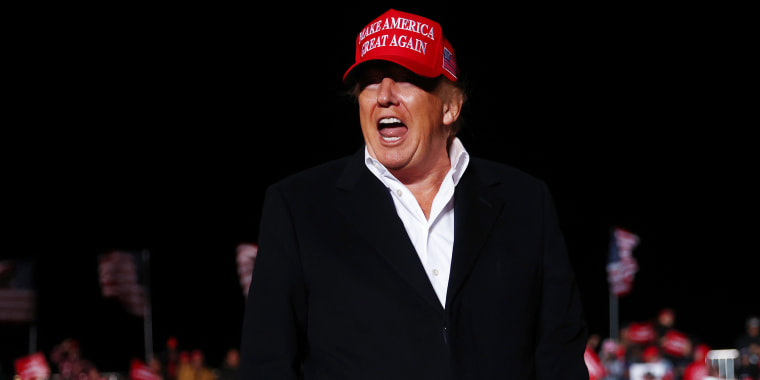UPDATE: (Aug. 12, 2022, 3:13 p.m. ET): NBC News on Friday obtained a copy of the warrant used in the FBI's search of former President Donald Trump's Mar-a-Lago home in Florida, as well as the related property receipt. The FBI recovered 11 sets of classified documents in the search, according to the documents.
Former President Donald Trump should never be president again. Frankly, he should never hold any position of public trust again. He attempted a self-coup. He lied. Over and over again. He used his office for personal financial gain. He was impeached twice. There is evidence that he attempted to obstruct a congressional proceeding, namely the counting of Electoral College votes, and that he tried to defraud the government by interfering with the certification of Electoral College votes. And there is reason to believe that, in violation of federal law, he took classified documents away from the White House.
Even if Monday’s search results in Trump being charged and convicted, it does not mean he'd be barred from holding federal office again.
At the very least, based on a search that the FBI conducted Monday, there appears to be evidence of a federal crime related to someone’s unauthorized taking of classified documents that are located at Mar-a-Lago, Trump's Florida residence. Trump hasn’t been charged with a crime but, in what might be a disappointment to many, even if Monday’s search eventually results in Trump being charged and convicted, it does not mean that he'd be barred from holding federal office again.
The FBI’s execution of a search warrant at the former president’s private residence is a legal bombshell. It is, luckily, without a historical analogue. We don’t want this to be normal or common. It shows a few important things. First, a federal law enforcement officer swore under oath that there is a probable cause that a federal crime was committed. Second, evidence of that crime was at Mar-a-Lago. Third, a federal magistrate judge made an independent assessment and agreed that probable cause existed to issue this warrant. It does not conclusively demonstrate that Trump will be indicted. For that, federal prosecutors would need evidence sufficient to prove, beyond a reasonable doubt, that Trump committed a crime.
But what happens if Trump is indicted and convicted? Well, he’d be the most infamous convict America has ever had, but he wouldn’t be barred from seeking federal office.
Trump, like every other American, is free to declare his candidacy for president as long as he was born in this country, is over 35, has lived here more than 14 years and has not already served eight years as president. With one possible caveat, these are the only qualifications listed in our Constitution.
Here’s the rub: Reports indicate that the FBI obtained a warrant to search Mar-a-Lago because there is evidence that Trump, in contravention of federal law, took with him classified documents when he left the White House. People who are charged and convicted with violating the federal law that prohibits the concealment, removal, mutilation, obliteration or destruction of certain government documents shall be “disqualified from holding any office under the United States.” Any federal office should include the presidency.
In a 1969 ruling, the Supreme Court suggested that Congress cannot add requirements to the constitutional qualification rules.
But the Constitution beats congressional statutes. And in a 1969 ruling that an elected member of the House who met the constitutional requirements for office could not be excluded by a vote of his congressional colleagues, the Supreme Court suggested that Congress cannot add requirements to the constitutional qualification rules.
It should be noted that there is a portion of the Constitution that could bar Trump from holding federal office. Section 3 of the Fourteenth Amendment prohibits people who “engaged in insurrection or rebellion” against the United States or gave “aid or comfort to the enemies” of the United States from holding a federal office. But that, among other challenges, would require proof of something quite different than improperly taking classified documents.
Where does this leave us? We are watching a legal, not a political, process play out. The Department of Justice is investigating potential federal crimes, and it is fair to conclude those potential crimes could include the former president. But the legal process may not provide all of the solutions to the problem. Trump is a threat to our country. He should not be elected to any federal office. We have the unique opportunity of having seen him hold office before; so we know for sure he should never hold such an office again. But congressional statutes will not bar him from being president once more. The Constitution might, but that is a difficult route. The easiest solution is a political one. The country ought not to vote for Trump, someone who should be disqualified in the eyes of all voters, even if he isn’t disqualified by the law.

